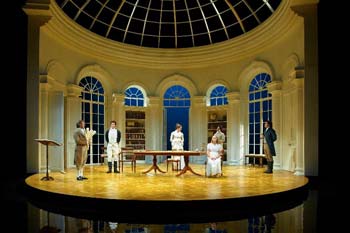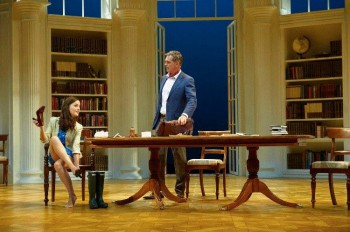Arcadia – amusing, baffling and entrancing

Love story: some assembly required.
Transcending timelines, Tom Stoppard’s Arcadia is an incredibly clever play where everything in the past influences future discoveries like the butterfly effect and the audience feel as though they are actively piecing it together like a jigsaw puzzle. Laced with intellectual banter and intricately intertwined subplots, Arcadia is amusing, baffling and entrancing.
In 1809, Septimus Hodge educates Lady Thomasina Coverly in Sidley Park, Derbyshire amidst poorly disguised scandals, an array of eccentric relatives and guests, and a debatably revolutionary garden renovation. Meanwhile, in 1989 garden historian Hannah Jarvis and academic Bernard Nightingale meet in the same house where the Coverly descendents reside, both with separate historical endeavours. The play preoccupies itself with the nature of time, and the mysteries of mathematics, science, love and sexual attraction.
The characters in each timeline interact in a larger than life fashion. Scott Sheridan as the cunning Septimus Hodge dominates the stage with his quick wit, explosive gestures and fervent energy. Only when Whitney Richards accompanies him as the impulsive and devastatingly intelligent Thomasina is he challenged for delivering the most rapid and sharp responses.
Andrew McFarlane thrives as the flustered Bernard, while Kirsty Hillhouse complements him as calm and collected Hannah. Valentine Coverly is another notable character, portrayed with a subtle charisma by Nick Maclaine, sometimes engaging fully in avid exchanges or offering well-timed remarks.

Although at times some of the particularly lengthy exchanges with minimal movement become temporarily dry, for the most part the performance powers on at a furious pace through the huge personalities of the characters. It isn’t difficult to become immersed in the action when each accent has been coached brilliantly by Jenny Davis and the movement is choreographed seamlessly by Lisa Scott-Murphy, extraordinarily when the timelines eventually merge.
Elaborate, elevated on a circular platform, and relatively unchanging, Alicia Clements’ set and costume design is visually stunning. Costumes are characteristic and each scene occurs in the same reading room. Movement to and from the set through side doors and a back door to the garden keeps the stage dynamic, while the costumes provide an atmosphere to transport the audience through time.
Ash Gibson Greig composes enchanting music to segment the movement through time fluidly, coupled with Trent Suidgeest’s dimmed lighting. While there are few internal sound effects and the light is predominantly fixed, there are apt intervals with chirping birds, internal music, and a brief fireworks display to complete that added dimension.
Despite moments where the pace slowed and some of the more rushed dialogue deliveries left the audience struggling to understand the connections, overall the precocious nature of Arcadia is astounding. Directed by Kate Cherry, the characters are likeable, the ending satisfyingly bitter-sweet, and the wit sharp enough to cut thin air. Not in the slightest a play for mindless viewing, Tom Stoppard’s play easily surpasses expectations.
